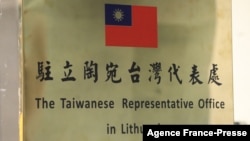Taiwan has pledged $1 billion to Lithuania in its latest move to counter China’s pressure on the small Baltic nation — the first European Union member to allow Taipei to use its name on a de facto embassy.
Taiwan’s promise made Tuesday will help fund joint projects in half a dozen sectors and comes after a January 5 agreement to invest $200 million in Lithuanian industry.
The combined $1.2 billion investment aims to counter China’s increasing pressure on Vilnius since November 18, when Lithuanian authorities allowed Taiwan to open a representative office in its capital under the name “Taiwan” instead of “Taipei.”
That gesture upset China, which views Taiwan as part of its territory. In the past two months, China has recalled its ambassador from Vilnius while ordering Lithuania’s ambassador to leave Beijing, and it has implemented an embargo against Lithuania, boycotting all of its exports as well as any EU products that use Lithuanian-made components.
In a press conference Wednesday, Chinese Foreign Ministry spokesperson Wang Wenbin called the $1.2 billion investment “the Taiwan authorities’ attempts to expand space for Taiwan independence activities with dollar diplomacy.”
China sees Taiwan eventually returning to its control, even though many Taiwanese perceive themselves as a self-governing nation.
“None of us thought the trade volume between Lithuania and China was that large, so we figured China wouldn’t use economic sanctions against them,” Chang Fu-chang, an associate professor with the Graduate Institute of European Studies at Tamkang University in Taiwan, told VOA Mandarin. “But we were wrong.”
Bor Yunchang, an economics professor at the Chinese Culture University in Taipei, is pessimistic about Taiwan’s investments. He told VOA Mandarin: “Any investment made for political gains will be on thin ice. It just can’t be as effective in connecting the two countries as capital flows among private sectors.”
China’s revenge
In most European countries and the United States, Taiwan uses Taipei, the name of its capital, for its foreign offices that are embassies in all but their official designation. Lithuania’s move came as many governments are exploring expanded ties with Taiwan, a high-tech industry powerhouse, even as Beijing’s increasingly assertive foreign and military policy in the region has caused uneasiness worldwide.
Taiwan’s presence in Vilnius is its first new representative office in Europe since the Taipei Representative Office opened in Bratislava, Slovakia, in 2003. When the office opened, China’s Foreign Ministry accused Lithuania of “undermining Chinese sovereignty and territorial integrity" and told Vilnius to “correct the mistakes immediately.”
“This development is really striking,” Timothy Heath, a senior defense analyst at the Rand Corporation, told VOA’s Russian Service, referring to the Vilnius office. “It is the first time a European country has expressed formal recognition of Taiwan in decades. It’s a pretty big development, and understandably China is very angry at this change.”
Relations between the two countries were fraying before Taiwan’s newest office opened. In August, Beijing stopped approving new permits for Lithuanian food exports to China and halted direct freight train service to Lithuania. Then, in November, China began pressuring companies in the EU to stop using Lithuanian components.
Mantas Adomenas, Lithuania's vice minister for foreign affairs, told Reuters in December that China had “been sending messages to multinationals that if they use parts and supplies from Lithuania, they will no longer be allowed to sell to the Chinese market or get supplies there,"
In a videoconference with Taiwan’s National Development Council Minister Kung Ming-Hsin on Tuesday, Aušrinė Armonaitė, Lithuania’s minister of the economy and innovation, said Vilnius was already seeing companies cancel contracts with Lithuanian providers because of pressure from Beijing.
“I think China is very worried that Lithuania is setting a precedent and more countries in Europe could follow Lithuania’s example. I think this is the reason why China has reacted so harshly,” said Heath.
Future unclear
Chang of Taiwan’s Tamkang University said China’s targeting of multinational companies in EU member states outside Lithuania is particularly effective because the enterprises value the lucrative Chinese market.
He said Lithuania’s biggest trading partners include two other Baltic countries — Estonia and Latvia — and Russia and the EU.
Chang added that while “Taiwan has stepped up its efforts in developing trade relations with Vilnius, Lithuania’s export structure is unlikely to change in the short term.”
There are also different opinions among Lithuania’s leaders over their nation’s trade policy with China. In early January, Lithuanian President Gitanas Nauseda said it had been a “mistake” to allow use of the Taiwan designation.
Chang said external pressure and internal disputes are hampering efforts by the Lithuanian government to obtain public support for its policy on China and Taiwan. Within the government, diverging views of the president and the prime minister have triggered a confrontation between pro-China and anti-China factions, he added.
“So the big question is how long can the Lithuanian government stand by Taiwan,” Chang told VOA Mandarin. “That $1.2 billion isn’t a big amount, so, long term, it’s hard to say where the economic relationship between the two countries will be.”
Heath of the Rand Corporation said that many countries are taking a “wait and see” attitude on whether they might want to consider the path Lithuania has taken.
“I think in the near term, the EU recognizes the importance of the trade relations with China. The larger countries — France, Germany, Italy — are not in a rush to destabilize their trade relationship with China,” he told VOA Mandarin.
Heath continued: “Nevertheless, I think countries in Europe and around the world are watching closely: What happens to Lithuania? Does it back off its relationship with Taiwan? Or does it maintain it? Whatever it decides, many countries in the world will be watching carefully and thinking about what that might mean for their own relationship with Taiwan.”
VOA Russian Service reporter Vadim Allen contributed to this report originated by the VOA Mandarin Service.








